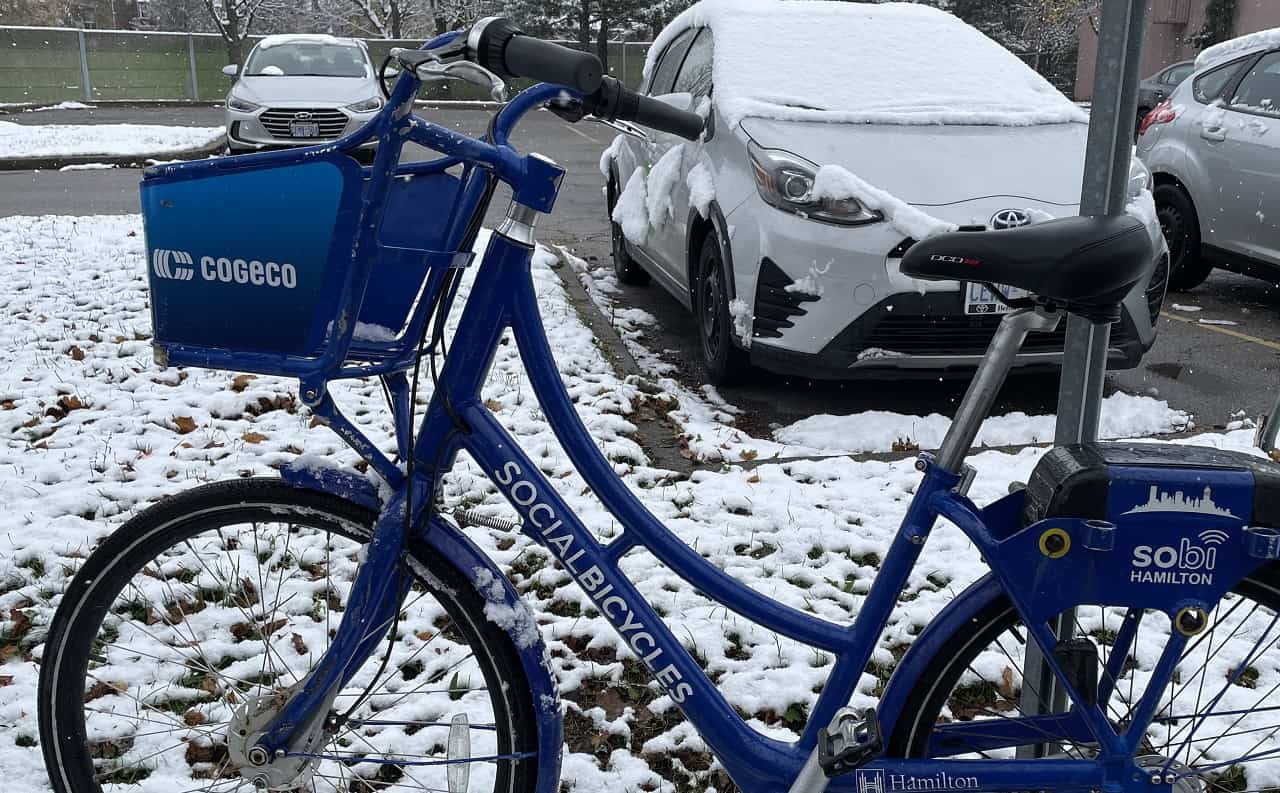Vote on city funding of Hamilton Bike Share Inc. looming
Published February 24, 2022 at 7:11 pm

Hamilton Bike Share Inc. could begin receiving municipal funding if a motion moved by Mayor Fred Eisenberger is passed.
On Friday, discussion items for a general issues committee (GIC) meeting includes a staff report which calls for HBSI to “be transitioned from the current approach which provides no City contribution towards system operations or towards asset management to a Partnership Model approach which includes a City contribution toward operating and asset management costs.” The city would contribute just over $1.1 million over three-plus years — which pro-rates to $302,400 annually — to help HBSI covers its costs through the end of 2025.
Additionally, the City of Hamilton would also chip in $130,000 annually for connectivity to a mobile network, another $108,000 to build a bike-share capital reserve, and $54,000 to support the Everybody Rides bike share equity program. That latter, which HBSI added in 2017, provides completely free and heavily discounted bike passes to lower-income residents. All of those amounts would be pro-rated for the final eight months of this year and would be included in the operating budget.
Since launching in 2015, Hamilton Bike Share has been used nearly 2 million times and claims 26,000 subscribers. It has a fleet of 900 bikes covering a grid in central Hamilton, also known the lower city.
Five of the six pieces of correspondence about the program that are included in Friday’s GIC agenda spoke positively about it. All five in favour were sent by women, and the only negative voice came from a man. The Royal Botanical Gardens also submitted a letter in favour.
TOMORROW Council will decide whether or not our City will publicly fund #HamOnt Bike Share. It is an affordable option that makes cycling accessible.
SEND AN EMAIL to Mayor Eisenberger and your Councillor to let them know you support publicly funding it@CycleHamilton pic.twitter.com/qz7Hmt0a9c— Environment Hamilton (@EnvHamilton) February 24, 2022
“These bicycles are part of our public transportation system and should not be shunted aside as frivolous,” wrote Beverly Wagar, a one-time competitive cyclist. “The bike share program should be supported like any other mode of public transit.”
Wagar noted that she is a car owner, and communicant Ainsley Gelder also noted that encouraging cycling can help with Hamilton’s management of the climate catastrophe. The city declared a climate emergency in 2019.
“Our City needs to move forward with accessible modes of transportation while trying to work its way out of the declared Climate Emergency,” Gelder wrote, adding, “Having this program means making it easier to move around to reduce greenhouse gas emissions.”
The lone critical submission, from David M. Dore, read: “If there isn’t a successful business plan where Bike share is self sustaining why are tax payers being asked to subsidize it? Please respect my tax dollars!!”
Toronto’s private operator costs more
The staff report cites funding models for bike share programs in eight other North American cities, including Toronto and Buffalo. All eight are publicly owned. Toronto and Sacramento, Calif., were the only two who contract out operations to a private company.
Bike Share Toronto also pays $103 per manual bike, per month, to their for-profit operator, to keep their fleet operation. Hamilton, by comparison, would be paying $90.
Hamilton Bike Share Inc. has hit bumps in the road in becoming a fixture in Hamilton.
In the spring of 2020, it was nearly parked permanently after Uber Inc. walked away from a funding arrangement and city council voted against using Wards 1, 2 and 3 capital reserve funds to keep it operating. In a matter of days, a fundraising initiative in the community got the bikes back in their stands and on city streets.
insauga's Editorial Standards and Policies advertising





